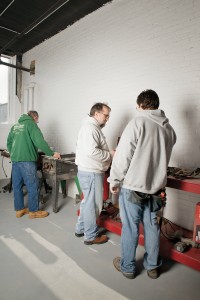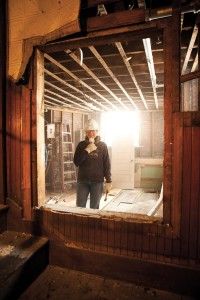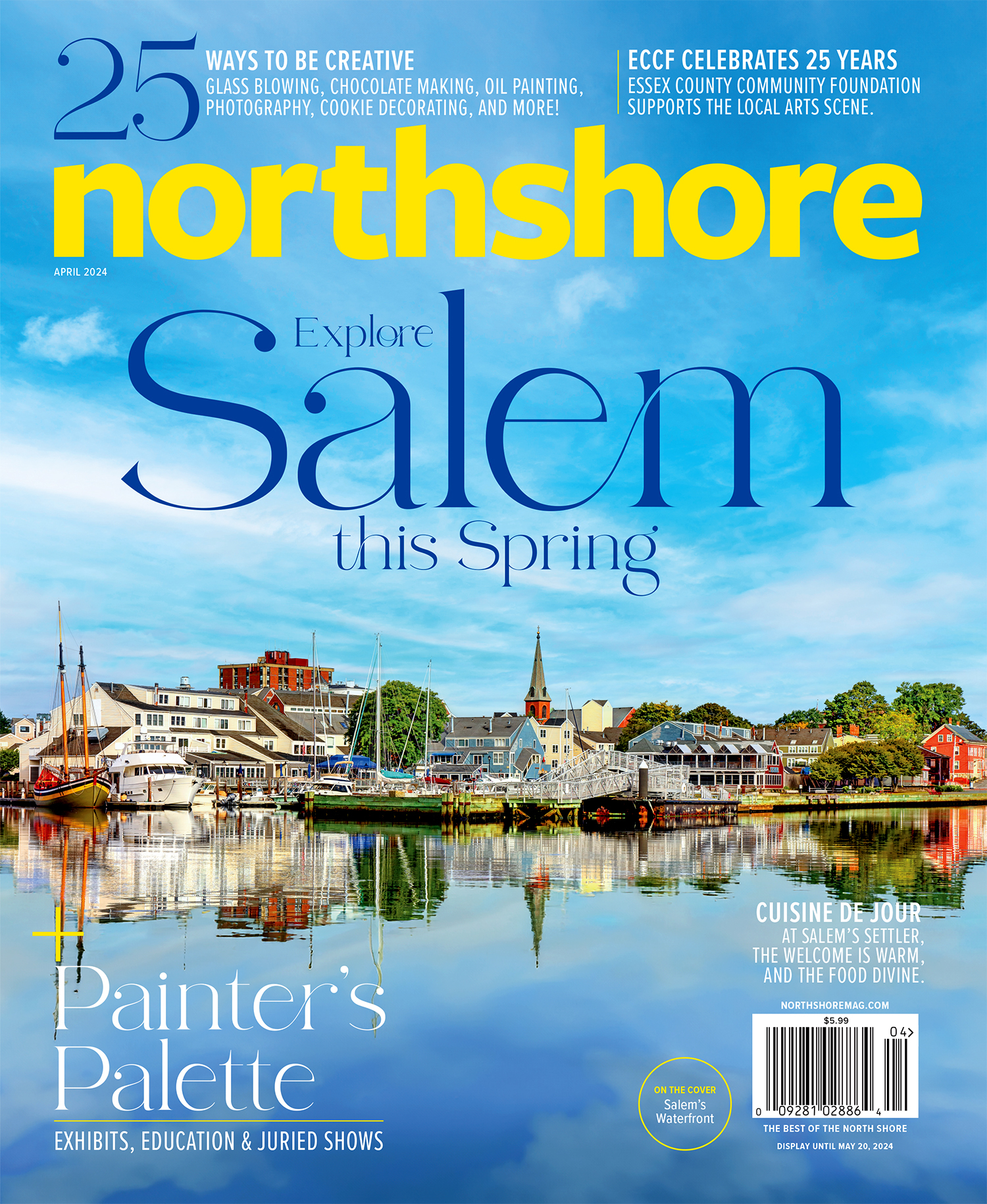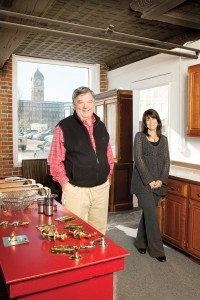 ReStore operates hundreds of locations throughout the United States and Canada, making for a lot of diverse inventory and, as Emerson Dahmen, building director for Merrimack Valley Habitat for Humanity, calls it, “oddball stuff.” Mason says ReStores in Florida have a lot of knick-knack-type items, whereas the ones in Dover, New Hampshire, and Portland, Maine, are geared toward building materials. ReStore accepts donations of anything from microwaves…to lumber and plywood.
“We’re constantly getting more donations and more diversity,” says Dahmen. “For instance, I’ve just been in touch with somebody who has a hardware store that’s going out of business, and they want to donate the residual bolts, screws, plumbing and electrical parts, and home and garden stuff to us.”
Mason says a manager at another ReStore called the place a “toy store for the do-it-yourselfer,” and that label seems to be an accurate one, not to mention fun. People who love to spend their Saturdays hunting for bargains could add ReStore to their list of weekly places to check out just-donated items, some of which might be antiques or one-of-a-kind treasures.
For example, Habitat for Humanity itself is donating a huge, beautiful fireplace mantle from the former St. Patrick Convent at 100 Parker Street in Lawrence, which the organization is converting to affordable housing. Habitat for Humanity bought the building and has been working to convert it into 10 multi-bedroom condo-style housing units, the first few of which they hope will be available by the end of 2011.
In addition to the mantle, workers at 100 Parker Street have reclaimed other items that could be donated, like pretty metal brackets and pieces of the old tin ceiling. The renovation work at St. Patrick Convent, the building of ReStore, and even the Merrimack Valley Habitat offices themselves speak to a larger effort by Habitat for Humanity in becoming part of the revitalization of Lawrence.
“We’re very committed to the city…We recognize that there’s a great need here. Lawrence is such a unique place. There are more not-for-profits in Lawrence than there are in any other city in the Commonwealth,” Mason says. “The percentage of impoverished living conditions-poverty housing-in Lawrence is awful. Every time we build a home, every time a family comes in, we change that statistic.”
Habitat for Humanity is also helping to change the future of the city’s historic buildings. ReStore will be located in the Duck Mill complex on Union Street, which used to house Ippolito’s Furniture but has recently stood empty and abandoned. Since taking over the space, Habitat for Humanity has added refurbishing the ReStore space to its already long list of building projects. According to Dahmen, workers have done things like take out the original bathroom to make it wheelchair accessible; remove two sets of stairs to build an accessible ramp entrance; build a manager’s office; take out partition walls; remove musty rugs and add new carpets; replace a cracked window; replace the back door to make it handicap-accessible with an electric button system and intercom; and scrape, scrub, and repaint everything else.
“What I love about what we’re doing is that it stays true to the nature of the environment in which it already exists,” says Mason. “We’re not razing it and building something that’s architecturally different from what’s around it. We’re reusing these magnificent mills.”
Down the street from ReStore, the St. Patrick Convent was poised to be torn down before Habitat for Humanity stepped in and bought it. Now, Habitat is not only turning the building into affordable-housing units, but also preserving it, doing things such as refurbishing the original woodwork and bringing the original banister up to code. “We are preserving a wonderful old building that is part of Lawrence’s heritage, and we are maintaining that building in substantially its original shape,” Dahmen says.
Even Habitat’s offices are in a reclaimed mill on Island Street in Lawrence’s historic Canal District. “This building is a beautiful example of what revitalization means. A lot of attention was paid to keeping it not only environmentally sound, but a place that was welcoming and accommodating to a workforce.” And the new ReStore will be just across the street.
“It’s been abandoned for a while,” says Mason. “And here you have Cambridge College, New Balance, you have this office building,” she says of the outfits that have made their homes in the South Lawrence mills.
What’s more, the act of reusing old buildings fits in with ReStore’s mission to reclaim items that would otherwise go to waste. “We’re
ReStore operates hundreds of locations throughout the United States and Canada, making for a lot of diverse inventory and, as Emerson Dahmen, building director for Merrimack Valley Habitat for Humanity, calls it, “oddball stuff.” Mason says ReStores in Florida have a lot of knick-knack-type items, whereas the ones in Dover, New Hampshire, and Portland, Maine, are geared toward building materials. ReStore accepts donations of anything from microwaves…to lumber and plywood.
“We’re constantly getting more donations and more diversity,” says Dahmen. “For instance, I’ve just been in touch with somebody who has a hardware store that’s going out of business, and they want to donate the residual bolts, screws, plumbing and electrical parts, and home and garden stuff to us.”
Mason says a manager at another ReStore called the place a “toy store for the do-it-yourselfer,” and that label seems to be an accurate one, not to mention fun. People who love to spend their Saturdays hunting for bargains could add ReStore to their list of weekly places to check out just-donated items, some of which might be antiques or one-of-a-kind treasures.
For example, Habitat for Humanity itself is donating a huge, beautiful fireplace mantle from the former St. Patrick Convent at 100 Parker Street in Lawrence, which the organization is converting to affordable housing. Habitat for Humanity bought the building and has been working to convert it into 10 multi-bedroom condo-style housing units, the first few of which they hope will be available by the end of 2011.
In addition to the mantle, workers at 100 Parker Street have reclaimed other items that could be donated, like pretty metal brackets and pieces of the old tin ceiling. The renovation work at St. Patrick Convent, the building of ReStore, and even the Merrimack Valley Habitat offices themselves speak to a larger effort by Habitat for Humanity in becoming part of the revitalization of Lawrence.
“We’re very committed to the city…We recognize that there’s a great need here. Lawrence is such a unique place. There are more not-for-profits in Lawrence than there are in any other city in the Commonwealth,” Mason says. “The percentage of impoverished living conditions-poverty housing-in Lawrence is awful. Every time we build a home, every time a family comes in, we change that statistic.”
Habitat for Humanity is also helping to change the future of the city’s historic buildings. ReStore will be located in the Duck Mill complex on Union Street, which used to house Ippolito’s Furniture but has recently stood empty and abandoned. Since taking over the space, Habitat for Humanity has added refurbishing the ReStore space to its already long list of building projects. According to Dahmen, workers have done things like take out the original bathroom to make it wheelchair accessible; remove two sets of stairs to build an accessible ramp entrance; build a manager’s office; take out partition walls; remove musty rugs and add new carpets; replace a cracked window; replace the back door to make it handicap-accessible with an electric button system and intercom; and scrape, scrub, and repaint everything else.
“What I love about what we’re doing is that it stays true to the nature of the environment in which it already exists,” says Mason. “We’re not razing it and building something that’s architecturally different from what’s around it. We’re reusing these magnificent mills.”
Down the street from ReStore, the St. Patrick Convent was poised to be torn down before Habitat for Humanity stepped in and bought it. Now, Habitat is not only turning the building into affordable-housing units, but also preserving it, doing things such as refurbishing the original woodwork and bringing the original banister up to code. “We are preserving a wonderful old building that is part of Lawrence’s heritage, and we are maintaining that building in substantially its original shape,” Dahmen says.
Even Habitat’s offices are in a reclaimed mill on Island Street in Lawrence’s historic Canal District. “This building is a beautiful example of what revitalization means. A lot of attention was paid to keeping it not only environmentally sound, but a place that was welcoming and accommodating to a workforce.” And the new ReStore will be just across the street.
“It’s been abandoned for a while,” says Mason. “And here you have Cambridge College, New Balance, you have this office building,” she says of the outfits that have made their homes in the South Lawrence mills.
What’s more, the act of reusing old buildings fits in with ReStore’s mission to reclaim items that would otherwise go to waste. “We’re  reusing mills to benefit building new homes in a reused building like Parker Street. It’s a full circle,” Howell says. “The offices are in a reused building and the store is in a reused building selling reused materials to revitalize a building to create homes for people who otherwise couldn’t afford homes.”
All of this work creates what Mason calls a “lovely ripple effect of revitalization in action.” When Habitat for Humanity builds something, whether it’s from the ground up or by renovating an existing structure, it starts building a community where there wasn’t one before. She points to a project where Habitat for Humanity built eight homes on an abandoned piece of land in Haverhill that had nothing across the street. A year later, a real estate developer built eight additional homes that looked very similar to the ones Habitat built.
“And you’ve got this neighborhood,” Mason says, with a “presto!” tone of voice. “You’ve got your cul-de-sac, American-dream neighborhood, right there where there was blight, where there was nothing.”
Mason says people’s desire to help Habitat for Humanity is huge, whether they donate their time, money, or items. Although the affiliate’s first priority is building affordable housing, most donated items will go to ReStore because of the organization’s specific building criteria for new homes, says Dahmen. “We’re pretty circumscribed in terms of what can go into a house, so an awful lot of stuff will go into ReStore,” he says. And that’s also a lot of stuff that might have otherwise been thrown away, which represents yet another ReStore perk: helping the environment. “We’re diverting stuff that would otherwise go into the waste stream and we’re repurposing it,” Dahmen says.
According to Mason, one local ReStore estimates that it has kept one million pounds of reclaimed items out of landfills. “A million pounds,” Mason repeats, incredulous. “That’s one store.” With stats like these, it’s clear that one ReStore really can have a huge impact on a community beyond raising money or being “green”: Habitat for Humanity homeowners often volunteer to help build other people’s homes, and with ReStore, even more people will be brought together as they constantly donate and buy items.
That’s why Mason’s opinion that Habitat’s work builds a “community of mankind” doesn’t sound bogus at all when you consider the huge pay-it-forward effect this ReStore could have on the community. Suddenly, all that “community of mankind” talk sounds very, very plausible.
“With ReStore, we have businesses, individuals, and families contributing and buying. We’re constantly bringing together communities that don’t see each other,” Mason says. “And that’s how you keep a community strong.” ReStore Lawrence, 4 Union Street, Lawrence, habitat.org/restores;Â Merrimack Valley Habitat for Humanity, 60 Island Street, Lawrence, 978-681-8858, merrimackvalleyhabitat.org.
reusing mills to benefit building new homes in a reused building like Parker Street. It’s a full circle,” Howell says. “The offices are in a reused building and the store is in a reused building selling reused materials to revitalize a building to create homes for people who otherwise couldn’t afford homes.”
All of this work creates what Mason calls a “lovely ripple effect of revitalization in action.” When Habitat for Humanity builds something, whether it’s from the ground up or by renovating an existing structure, it starts building a community where there wasn’t one before. She points to a project where Habitat for Humanity built eight homes on an abandoned piece of land in Haverhill that had nothing across the street. A year later, a real estate developer built eight additional homes that looked very similar to the ones Habitat built.
“And you’ve got this neighborhood,” Mason says, with a “presto!” tone of voice. “You’ve got your cul-de-sac, American-dream neighborhood, right there where there was blight, where there was nothing.”
Mason says people’s desire to help Habitat for Humanity is huge, whether they donate their time, money, or items. Although the affiliate’s first priority is building affordable housing, most donated items will go to ReStore because of the organization’s specific building criteria for new homes, says Dahmen. “We’re pretty circumscribed in terms of what can go into a house, so an awful lot of stuff will go into ReStore,” he says. And that’s also a lot of stuff that might have otherwise been thrown away, which represents yet another ReStore perk: helping the environment. “We’re diverting stuff that would otherwise go into the waste stream and we’re repurposing it,” Dahmen says.
According to Mason, one local ReStore estimates that it has kept one million pounds of reclaimed items out of landfills. “A million pounds,” Mason repeats, incredulous. “That’s one store.” With stats like these, it’s clear that one ReStore really can have a huge impact on a community beyond raising money or being “green”: Habitat for Humanity homeowners often volunteer to help build other people’s homes, and with ReStore, even more people will be brought together as they constantly donate and buy items.
That’s why Mason’s opinion that Habitat’s work builds a “community of mankind” doesn’t sound bogus at all when you consider the huge pay-it-forward effect this ReStore could have on the community. Suddenly, all that “community of mankind” talk sounds very, very plausible.
“With ReStore, we have businesses, individuals, and families contributing and buying. We’re constantly bringing together communities that don’t see each other,” Mason says. “And that’s how you keep a community strong.” ReStore Lawrence, 4 Union Street, Lawrence, habitat.org/restores;Â Merrimack Valley Habitat for Humanity, 60 Island Street, Lawrence, 978-681-8858, merrimackvalleyhabitat.org.

